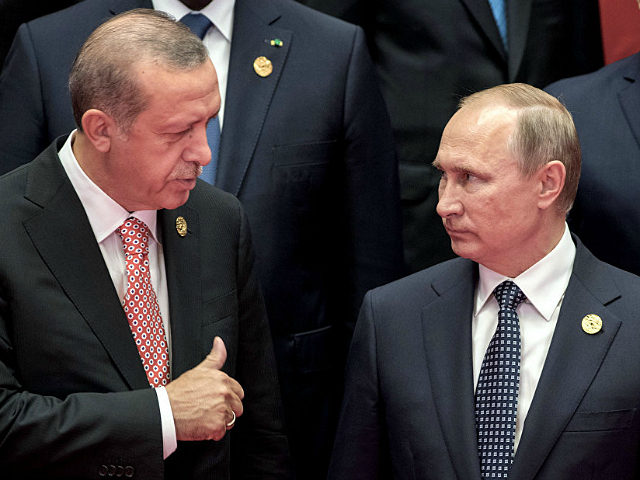Turkey appears to be thawing its previously challenging relationship with Russia just as disagreements about the role of the Syrian Kurdish militias in the fight against the Islamic State have become a point of contention with the United States.
The meetings between Turkish officials and President Barack Obama’s designated envoys to Ankara — U.S. Deputy Secretary of State Antony Blinken and Special Presidential Envoy for the Global Coalition to Counter Islamic State Brett McGurk — reportedly resulted in little consensus, with President Recep Tayyip Erdogan personally expressing concern that the United States may forge closer military ties with Syrian Kurdish militias on the ground in that nation. Voice of America reports that Erdogan particularly scolded McGurk for having “accept[ed] a medal from the Syrian Kurdish militia the YPG, a key U.S. ally in the war against Islamic State,” telling him, “don’t do it again.”
The YPG (People’s Protection Units) is a militia working in tandem with Kurdish separatists in the region of Syria Kurds call Rojava; it has been among the most successful military units in combatting the Islamic State in the region and many have suggested it is the best equipped militia to help take over Raqqa, the de facto capital of the Islamic State.
The YPG has close ties to the Kurdistan Workers’ Party (PKK), a U.S.-designated Marxist terrorist group. Washington sees them as separate entities, condemning the PKK while cooperating with the YPG to launch airstrikes against jihadi targets. Ankara sees them as one in the same: Kurdish “terrorists” looking to carve a state out of parts of Syria and Turkey.
Secretary of Defense Ashton Carter has publicly acknowledged that the YPG and PKK work together. The PKK has spread itself far east of Turkey, establishing itself as far as northern Iraq, where communist PKK fighters were largely responsible for defeating ISIS in the Yazidi enclave of Sinjar, much to the chagrin of the Iraqi Kurds (the Kurdistan Regional Government, KRG). The KRG enjoys warm relations with Ankara and has repeatedly condemned the PKK and YPG.
That admission has not prevented Washington from considering the arming of the YPG directly. A New York Times article published as Erdogan was in New York for the UN General Assembly claimed President Obama was strongly considering it. This week, The Guardian reports that it is already happening. While the U.S. has openly been supplying arms to a coalition known as the Syrian Democratic Forces (SDF) — comprised of the YPG and a variety of Arab rebel groups — American officials have insisted they have only provided weapons to Arab groups, not the Kurds.
“The officials say that the US is supplying only light weapons and they are going to the Arab contingent of the Syrian Democratic Forces (SDF). However, Kurdish officials linked to the People’s Protection Units (YPG), the dominant partner in the SDF, say they have been promised the US will arm them directly if they lead the battle for Isis’s Syrian stronghold in Raqqa,” The Guardian reports.
An official told The Guardian that the U.S. is “looking at establishing a live-and-let-live arrangement” between Turkey and the Syrian Kurds.
Turkey, meanwhile, appears to have moved onto to establishing a live-and-let-live arrangement between itself and the Syrian government. Erdogan has been among the most vocal critics of dictator Bashar al-Assad, calling him a “terrorist” and insisting on his removal from power. Assad has persisted in power, however, largely due to the benevolence of Moscow. And now, as Turkey looks to a power they can rely on to not work with the Kurds, it is turning its eyes towards Russia.
“If Russia is prepared to cooperate with us on the cease-fire and humanitarian aid, we are more than ready,” Turkish Foreign Minister Mevlüt Çavuşoğlu said on Thursday, in the latest expression of cooperation between the two countries since diplomats began working on remedying their thorny relationship. Russia and Turkey have suffered a difficult diplomatic situation since November, when the Turkish military shot down a Russian fighter jet that had entered its airspace. Russia had been routinely violating Turkish airspace at the time as it executed airstrikes over rebel-held territories on the Syria-Turkey border.
Since that incident, relations have improved as Russia extended its support to Erdogan following the failed July 15 coup. Putin is now reportedly planning a trip to Turkey next month, according to a Kremlin spokesman.
“Now, after nearly a year has passed since the cooling of relations, there is a tendency that cooperation with Turkey on the Syrian track will be constructive. And the concern that we have, as well as issues on which we are far from agreement, we are discussing constructively,” Russian Foreign Ministry spokeswoman Maria Zakharova said on Thursday, reciprocating the desire for cooperation.

COMMENTS
Please let us know if you're having issues with commenting.